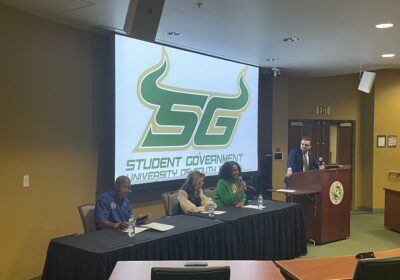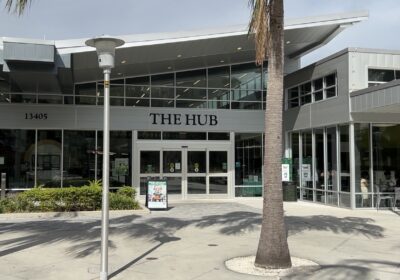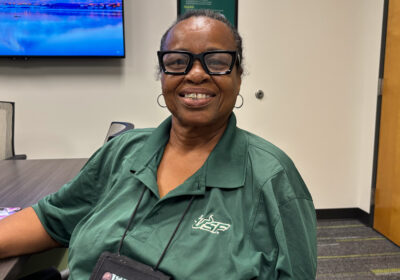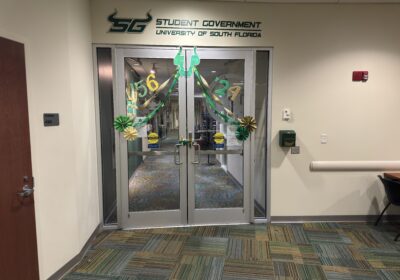Students adapt to virtual volunteering during pandemic

Since COVID-19 has prevented students from participating in traditional in-person volunteering, individuals and organizations alike are turning to a virtual format to still support their communities during the pandemic.
As a result of COVID-19, students cannot congregate or go out into the community to serve due to USF’s health and safety guidelines. To combat this, students and organizations have taken to their computers. They have organized fundraisers, edited documents, arranged phone calls with the elderly and participated in a variety of other services to help others in a time when people are most in need.
During a normal semester, the Center for Leadership and Civic Engagement (CLCE) would be hosting an in-person Stampede of Service (SOS). Each section of SOS lasts for a month and follows a theme dictated by the United Nations’ Sustainable Development Goals (SDGs). Students would traditionally gather together on campus for a three-part series of events.
The events would include an initial overview of service and then the students would actually go out and serve the community in a way that aligned with the development goal of the month, according to CLCE Director Mike Severy. The month would conclude with a meeting where students come back together and reflect on the service they completed.
“The history of Stampede of Service was tethered to the National Day of Service,” Severy said. “The longer term history is that the original iteration of the SOS was to meet students where they were. It was to give students at USF exposure to volunteerism experiences.”
The October theme of SOS aligns with SDG Two: “No Hunger.” This goal aims to have all forms of hunger and starvation eliminated by 2030. But fighting hunger virtually is difficult, according to Severy.
“We are working as best we can to see how we can navigate [combating hunger] with no-contact service pieces,” he said.
The CLCE is working to fundraise for local shelters, according to Severy. He said that it is also coming up with low-contact services, like working in a community garden which allows for social distancing and mask-wearing.
“It makes it difficult to meet the needs that we know exist which have been elevated in some ways because of the pandemic,” Severy said.
The department will also offer a virtual volunteer fair for students who would like to get involved with volunteering on Oct. 9 from 11 a.m to 1 p.m on Teams. According to a post about the event, there will be over 30 community partners present for students to engage with.
The CLCE is not the only organization that has had a difficult time serving the community’s needs virtually. The volunteer committee of the Judy Genshaft Honors College Student Council has also struggled to find ways to serve.
“Some organizations that need help don’t even have the technology for virtual volunteering,” sophomore and co-chair of the volunteer committee Shalini Subramanian said. “That is definitely something that is hard to accommodate.”
The volunteer committee has been working with aging services to provide group calls to the elderly, the group which has been impacted the most by the pandemic.
“The seniors are at their homes because the actual centers are not open due to COVID,” Subramanian said. “They are missing that social interaction and the events that they used to have.”
Typically, volunteer committee service events are in person, according to sophomore Naziza Naeer Bhuiyan, fellow co-chair of the committee. It would be working with Dance Marathon, Habitat for Humanity, food drives and other events with community partners.
“It would be way more hands-on,” Bhuiyan said.
Though it is difficult to find events, she said the struggle is worth the cause.
“It may not be as rewarding for us as the volunteers, but if you think about it, times are tough,” Bhuiyan said. “The people we are volunteering for are very in need of our assistance, so maybe they appreciate it more than in normal circumstances.”
Israel Jimenez, junior and volunteering committee captain for Health Occupations Students of America, expressed similar sentiments.
“Adapting to these virtual events was a little difficult at first,” he said. “I have never virtually volunteered and was a little bummed out that we wouldn’t be able to do in-person volunteering because it’s one of my favorite ways to meet new people.”
Despite the difficulty, he said that he was able to get in touch with even more organizations because of the nature of virtual volunteering.
“This past September, we participated in our first virtual event for [St. Jude Children’s Research Hospital], a Walk/Run to end Childhood Cancer,” Jimenez said. “We had about nine members complete virtual tasks throughout the week of the race. It was simple things like attending their Instagram livestreams, liking and sharing their Instagram posts and even making posters at home and creating Boomerangs with them to post on their story to cheer on the racers.”
The ease of virtual volunteering has also made a difference to Ellen Frahm, senior and president of the national service fraternity Alpha Phi Omega.
“It is nice to be able to do good for the community when I even have so much as a few minutes to spare,” Frahm said.
Alpha Chi Omega has been using applications such as FreeRice, Charity Miles and LibriVox to donate to the community as well as the Special Olympics.
“Despite everything, I still feel like we are making a difference in our community as a chapter,” Frahm said.
Krupa Patel, junior and president of KidsPACK, said she feels that the virtual volunteering has benefited her club during the pandemic.
“It is a good opportunity to socialize with other students since there are fewer opportunities to interact with other students these days,” Patel said.
Some students, like senior Jessica Thomlinson, have moved away from organizations to virtually volunteer on their own.
“I volunteer virtually for an animal training group called Well Behaved Pets twice a week,” she said. “Members post what they are struggling with and I pull down lessons and articles written by a professional animal trainer.”
Freshman Meghan Tran also participates in individual virtual volunteering.
“I’m doing virtual volunteering for Zooniverse,” Tran said. “It’s great because there are different activities related to science and research that I can be involved in. I even analyze baby noises which is weird, but cool.”
Both individually and in groups, through virtual meetings and club events, students have found a variety of ways to serve their communities during the pandemic. For Severy, the continuation of service is “absolutely vital.”
“The needs have not gone away,” Severy said. “Continue to seek out how you can help out your neighbors, colleagues and community members. Every little bit that you do helps.”






